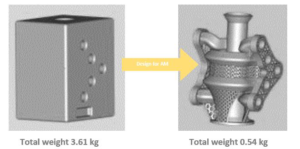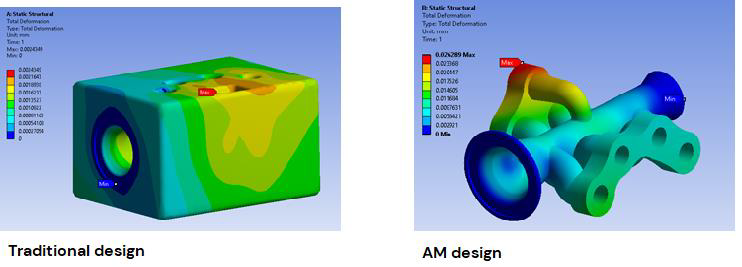Designing the Hydraulic Manifold Block for Additive Manufacturing (DfAM).
Additive Manufacturing (AM) replaces traditional manufacturing process with a higher level of design freedom, part integration to reduce weight and improve the media flow paths with varied geometry shapes and size of internal channels for ideal flow by maintaining the structural integrity.
Challenges
The traditional manufacturing of hydraulic manifold block causes very high machining costs with milling and drilling operations to create the internal fluid channels that are in straight lines or angular lines leading to high cost and long lead time.
- Abrupt angled junctions between flow path can cause flow stagnation with dead legs and an increase in hold up volume resulting in the loss of flow efficiency.
- The edges create stresses which are not loosened and cannot be removed while in operation.
- Dirt reservoirs are formed at areas with no fluid flow causing damage to failure to the whole system.
Result
The results of the manifold block were beyond expectation due to reduced build time, less material consumption reduced support removal and post-processing increased efficiency and no leakage in operation.
- Improved Performance: Structural integrity was drastically enhanced, and the deflections were 75%.
- Weight Reduction: Reduction of component weight from 3.61 kg to 0.54 kg leading to 75% mass reduction.
- Time Frame: The complete redesign to realize the lifecycle for the manifold block was reduced to 8 hours against conventional method of 30 hours.
- Improved flow efficiency up to 55%: The horizontal holes are no longer needed, the fluid can now flow around the corner and is not disturbed by corners and edges.
Additive Engineering & Design
The topology optimization for manifold was done in MS material (Maraging Steel) to meet the required design, reduced weight and enhance performance by reducing the pressure drop. The weight has immensely reduced without affecting all the inner channels.
| Existing CAD data |
Optimized CAD data |
| Part mass: 3.61 Kg |
Part mass: 0.54 Kg |
| Part Volume: 3,01,000 cm3 |
Part Volume: 45,000 cm3 |
| Equivalent stress: 124 Mpa |
Equivalent stress: 360 Mpa |
| Total displacement: 0.0024 mm |
Total displacement: 0.0026 mm |
Comparison of hydraulic manifold



